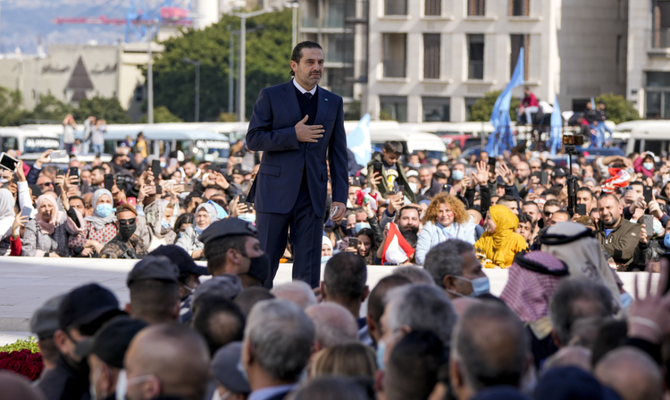BEIRUT: The situation in Lebanon is deteriorating, said former Prime Minister Saad Hariri during a meeting with his parliamentary bloc on Sunday.
Hariri met his supporters after he had paid his respects at the grave of his father, Rafik Hariri, on the 17th anniversary of his assassination in Beirut.
Prime Minister Najib Mikati and former premier Fouad Siniora also prayed at the grave.
Hariri said that his home in Beirut will remain open, and the Future Movement will continue to work with the people and provide services and assistance to them, and it will never abandon its people.
The anniversary is a few weeks after Hariri announced he was leaving politics for now and would not run in upcoming parliamentary elections.
Thousands gathered in front of Hariri’s tomb in Beirut for a moment of silence at 12:55 p.m., to commemorate the murder.
The supporters raised blue Future Movement banners and pictures of Saad Hariri, cheering and waving as he walked past them.
One supporter said: “How will become of life in Lebanon? The day of the assassination was a dark one, and it has gotten darker with Hariri’s withdrawal from political life.”
A woman from Tariq Al-Jadida said: “They killed the father and betrayed the son, so we became orphans, but we will never hand over our fate to them.”
The size of the crowd at Martyrs’ Square in downtown Beirut surprised event organizers.
People climbed the stairs of the Al-Amin Mosque next to the tomb and filled the parallel road.
The Future Movement did not invite its supporters to participate but supporters rallied for the commemoration on social media.
The annual gathering was different this year, as Hariri did not give his usual speech.
He simply recited Al-Fatihah in front of his father’s tomb, along with his aunt, MP Bahia Hariri, her husband and some family members.
He seemed very moved as he waved to the people who waited for him to greet them.
“The scene at the tomb says it all,” Hariri told the media.
Political, religious, diplomatic, social and economic figures visited Rafik Hariri’s tomb to mark the occasion. They included a Russian delegation, headed by Minister Plenipotentiary at the Russian Embassy in Lebanon Ivan Medvedsky.
Japanese Ambassador to Lebanon Takeshi Okubo tweeted on Monday, “We commemorate PM Rafik Hariri’s efforts with many countries, including Japan, for the reconstruction of Lebanon.”
Walid Jumblatt, head of the Progressive Socialist Party, said after visiting the tomb: “It was written for us to recite Al-Fatihah in Moukhtara, and in Beirut in Martyrs’ Square every year. It was written for us to persevere and we will.”
Former Future Movement MP Mustafa Alloush said: “We are seeing the results of the project that began with Rafik Hariri’s assassination, which is the invasion of the entire region that led to the destruction of Syria, Lebanon and Yemen.”
MP Mohammed Al-Hajjar noted: “Seventeen years have passed, and we are witnessing a state of denial and rejection of all calls for reform and commitment to Lebanon’s interests.
“Some still insist on dragging Lebanon away from our Arabism and true belonging. President Michel Aoun said we were going to Hell and Rafik Hariri’s assassination was certainly the gateway.”
Addressing his bloc MPs on Sunday, Hariri reaffirmed his withdrawal from political life, which he announced on Jan. 24.
He called on the Future Movement to take the same step and not to run for parliamentary elections or submit any nominations in the movement’s name.
He reportedly said: “Regardless of my political position and my decision, but my personal reading of the situation is that it will get worse, and my advice to you as a brother and not as a leader, is not to run for elections, because nothing portends positivity; spare yourselves the insults.”
Hariri had expressed his conviction that this step was correct because “there is no room for any positive opportunity for Lebanon, in light of Iranian influence, international confusion, national division, the rise of sectarian tensions and the deterioration of the state.”
When the MPs asked what they should do in the next stage in parliament, Hariri said: “Everyone must abide by their legislative duty, not boycott parliament. Participate in sessions and discuss the draft budget.
“Should there be a decision to extend the parliament mandate, then the bloc must boycott the session. The option to resign from parliament entirely would then be discussed.”
Hariri reportedly told MPs who wish to run for elections: “Every person who wants to run, believes they can win and has the financial, political and popular requirements to fight the electoral battle, can do whatever they want, but without using the name of Saad Hariri or the Future Movement.”
He added: “I will not provide cover for anyone and I do not want to be on anyone’s side.
“Make the alliances you believe serve you best, but you know who I do not want you to ally with.”
The bombing on Feb. 14, 2005, killed Rafik Hariri and Minister Bassem Fleihan and dozens of people who were in the Ain Al-Mraiseh area at the time.
















